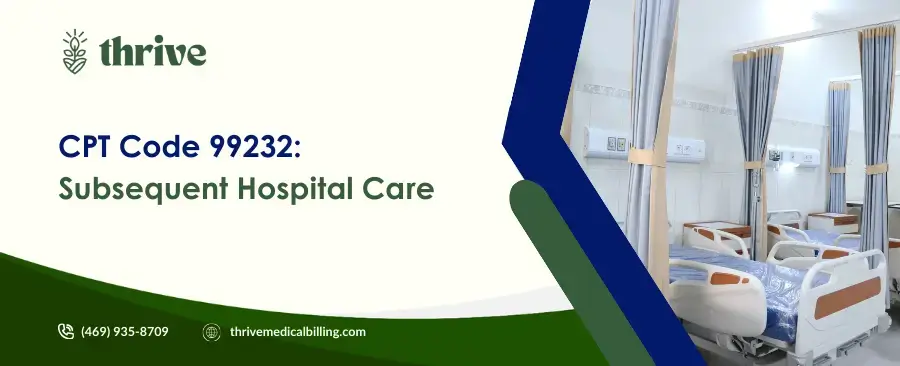Introduction to CPT Code 99232
CPT code 99232 is a procedural code used in medical billing to describe a subsequent hospital care evaluation and management (E/M) service for an inpatient, typically requiring a moderate level of medical decision-making or 25–34 minutes of total time spent on the date of the encounter. This code is part of the Current Procedural Terminology (CPT) system maintained by the American Medical Association (AMA) and is commonly used in hospital inpatient settings by physicians and qualified healthcare professionals. Understanding the 99232 CPT code is essential for healthcare providers and billing professionals to ensure accurate billing and avoid issues that lead to claim denials.
This guide provides a detailed overview of CPT code 99232, its applications, modifiers, Medicare reimbursement rates, and strategies to optimize billing for subsequent hospital care services addressing various medical conditions.
What is CPT Code 99232 and Subsequent Hospital Care?
CPT code 99232 represents a subsequent hospital care service provided to an inpatient during a hospital stay, typically on a day after the initial admission. It is used for evaluation and management (E/M) services that involve:
- A moderate level of medical decision-making (MDM), based on the complexity of the problem(s) addressed, data reviewed, and risk of complications or morbidity.
- OR 25–34 minutes of total time spent on the date of the encounter, including face-to-face and non-face-to-face activities (e.g., reviewing records, coordinating care, or documenting).
This code is used by physicians or qualified healthcare professionals (e.g., nurse practitioners, physician assistants) in hospital inpatient or observation settings to manage ongoing care for patients with conditions requiring moderate clinical effort. CPT code 99232 is commonly billed in specialties like internal medicine, cardiology, or hospitalist services for follow-up visits during a hospital stay.
Procedure Involving CPT Code 99232
The procedure involving CPT code 99232 includes the following components, as defined by the AMA’s E/M guidelines:
- Interval History: The physician collects a focused interval history, updating the patient’s condition since the last visit, including changes in symptoms, response to treatment, or new complaints.
- Physical Examination: A detailed examination of the affected body area or organ system, along with other related systems as needed, is performed to assess the patient’s current status.
- Medical Decision-Making (MDM): The physician evaluates the patient’s condition, reviews relevant data (e.g., labs, imaging, vital signs), and makes decisions about diagnosis, treatment adjustments, or discharge planning. For 99232, MDM is typically moderate, involving multiple diagnoses, moderate data complexity, or moderate risk of complications.
- Time-Based Billing (Optional): If time is used instead of MDM, the physician spends 25–34 minutes on the encounter, including activities like reviewing charts, consulting with other providers, or documenting in the medical record.
- Documentation: The physician documents the interval history, exam findings, MDM, or time spent to support the level of service billed.
The procedure occurs in a hospital inpatient or observation setting, such as a hospital ward or intensive care unit. CPT code 99232 is used for patients requiring ongoing management of moderately complex conditions during their hospital stay.
Comparison with Related CPT Codes
CPT code 99232 is part of the E/M code set for subsequent hospital care, which varies based on the level of service and complexity. Here’s how it compares to related codes:
- CPT Code 99231: Represents a subsequent hospital care visit with low MDM or 15–24 minutes of total time, used for stable or minimally complex conditions.
- CPT Code 99233: Covers a subsequent hospital care visit with high MDM or 35–49 minutes of total time, used for complex or unstable conditions.
- CPT Code 99221–99223: Describes initial hospital care for new or established patients on admission, unlike 99232 for subsequent visits.
- CPT Code 99238–99239: Represents hospital discharge services, distinct from ongoing inpatient care coded by 99232.
- CPT Code 99213: Covers an outpatient E/M visit for an established patient, not applicable to inpatient settings like 99232.
Choosing the correct procedural code is critical to ensure accurate billing. For example, billing CPT code 99232 for a low-complexity visit (99231) or an outpatient visit (99213) can lead to claim denials.
Modifiers for CPT Code 99232
Modifiers provide additional context for CPT code 99232 to ensure proper reimbursement. The following modifiers are sourced from the AMA’s CPT Professional Edition and CMS’s National Correct Coding Initiative (NCCI) Policy Manual:
- Modifier 24 (Unrelated E/M Service During Postoperative Period): Indicates an E/M service unrelated to a prior procedure’s postoperative period, as per AMA guidelines.
- Modifier 25 (Significant, Separately Identifiable E/M Service): Used when a separate procedure (e.g., minor bedside procedure) is performed on the same day as the 99232 visit, per CMS’s NCCI edits.
- Modifier 57 (Decision for Surgery): Applied when the 99232 visit results in a decision for major surgery, though less common with subsequent hospital care, as outlined in AMA standards.
- Modifier 99 (Multiple Modifiers): Used when multiple modifiers are needed, per AMA guidelines.
- Modifier AI (Principal Physician of Record): Used by the admitting physician to identify their role in coordinating inpatient care, particularly for Medicare claims, as per CMS’s Medicare Claims Processing Manual.
Providers must adhere to AMA and payer guidelines, including Medicare’s NCCI edits, to avoid errors that lead to claim denials. Note that Modifier 95 (Synchronous Telemedicine Service) is not typically applicable to 99232, as it is primarily an inpatient code, though telehealth policies may vary by payer.
Medicare Reimbursement Rates for CPT Code 99232
CPT code 99232 is reimbursable by Medicare, but reimbursement rates vary based on several factors:
- Medicare Physician Fee Schedule (MPFS): The MPFS provides payment rates for CPT code 99232, adjusted by the Geographic Practice Cost Index (GPCI) for regional cost differences, as outlined by CMS.
- Medicare Administrative Contractors (MACs): Regional MACs may impose specific billing rules or coverage criteria, such as Local Coverage Determinations (LCDs) for E/M services.
- Facility Rates: CPT code 99232 is typically billed in facility settings (e.g., hospitals), where reimbursement reflects professional services only, as facility costs are covered separately (e.g., via DRG payments).
- Documentation Requirements: Medicare requires detailed documentation to support moderate MDM or time spent, per CMS’s Medicare Claims Processing Manual.
To verify reimbursement rates for 2025, providers should:
- Check the MPFS on the Centers for Medicare & Medicaid Services (CMS) website.
- Consult their regional MAC for specific coverage policies and billing rules.
- Use coding tools like AAPC Coder or Kareo for rate estimates.
Accurate documentation of medical necessity, such as managing multiple chronic conditions or addressing acute inpatient issues, is critical for Medicare reimbursement.
Conditions Addressed with CPT Code 99232
CPT code 99232 is used to address a wide range of medical conditions during subsequent hospital care for inpatients, requiring moderate complexity. Examples include:
- Chronic Conditions: Managing conditions like congestive heart failure, chronic obstructive pulmonary disease (COPD), diabetes mellitus, or chronic kidney disease with treatment adjustments.
- Acute Conditions: Treating inpatient issues like pneumonia, urinary tract infections, or acute kidney injury requiring ongoing evaluation.
- Post-Surgical Care: Monitoring recovery after procedures like appendectomy or joint replacement, addressing complications or pain management.
- Complex Symptom Evaluation: Assessing symptoms like chest pain, shortness of breath, or altered mental status requiring moderate diagnostic workup.
- Coordination of Care: Managing multidisciplinary care for conditions like sepsis, stroke, or cancer during hospitalization.
The moderate complexity of CPT code 99232 makes it suitable for inpatient encounters involving multiple diagnoses or detailed clinical decision-making in hospitalist or specialty care.
Medical Billing Best Practices to Ensure Accurate Billing
To ensure accurate billing for CPT code 99232 and minimize issues that lead to claim denials, providers should adopt the following medical billing strategies:
- Train Staff: Educate billing staff on the 99232 CPT code, its differences from other E/M codes (99231, 99233), and appropriate modifiers, using resources like the AMA’s CPT Professional Edition.
- Use EHR Systems: Electronic health records like Epic, Cerner, or Meditech streamline documentation and coding for subsequent hospital care.
- Document Medical Necessity: Clearly note the interval history, exam findings, MDM, or time spent to justify the moderate complexity of 99232, aligning with AMA and CMS guidelines.
- Verify Payer Guidelines: Confirm Medicare and private payer rules for CPT code 99232, especially regarding frequency, modifier use, and documentation requirements.
- Conduct Regular Audits: Review claims to ensure compliance with E/M guidelines and identify errors, using tools like AAPC Coder or internal audit processes.
These practices optimize revenue cycle management and improve financial outcomes for hospitalist and inpatient care practices.
Common Errors That Lead to Claim Denials
Billing errors for CPT code 99232 can lead to claim denials, delaying reimbursement. Common mistakes include:
- Incorrect Code Selection: Billing CPT code 99232 for a low-complexity visit (99231) or high-complexity visit (99233), or for an initial hospital admission (99221–99223).
- Improper Modifier Use: Applying Modifier 25 without a separate, significant procedure or omitting Modifier AI for Medicare claims when required, per CMS’s NCCI Policy Manual.
- Inadequate Documentation: Failing to document the interval history, exam, MDM, or time required to support 99232, leading to downcoding or denials.
- Unbundling Errors: Billing CPT code 99232 with other E/M codes or procedures without justification, violating NCCI edits.
- Non-Compliance with Payer Policies: Not adhering to Medicare or private payer rules for visit frequency or medical necessity.
Providers should verify codes, modifiers, and documentation to ensure accurate billing and avoid denials, aligning with AMA and CMS standards.
Conclusion and Resources
CPT code 99232 is a critical procedural code for subsequent hospital care evaluation and management services, addressing moderately complex conditions in hospital inpatient settings, such as chronic diseases, acute illnesses, or post-surgical care. By understanding the 99232 CPT code, its modifiers, Medicare reimbursement rates, and best practices for medical billing, providers can ensure accurate billing and minimize issues that lead to claim denials. For further guidance, consult:
- CMS Website: For MPFS, NCCI edits, and reimbursement rates.
- American Medical Association (AMA): For CPT code updates and E/M guidelines.
- Society of Hospital Medicine (SHM): For resources on hospitalist care and subsequent hospital care coding.
By staying informed and proactive, healthcare providers can optimize billing for CPT code 99232 and enhance patient care through effective inpatient management.







